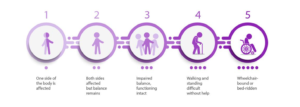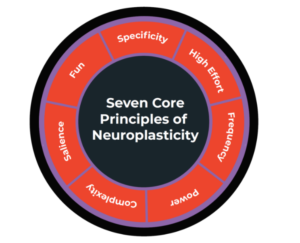Free Phone 0800 000 856
Parkinson’s
Our physiotherapy team have a wealth of experience and expertise in working with people with Parkinson’s Disease (PD). The best time to start physio is as soon as you are diagnosed because a robust, specific exercise programme combined with medication is proven to be the best way to delay progression of symptoms.
We offer one on one physiotherapy sessions and tailored exercise classes specifically designed for people with PD. If you have been recently diagnosed with PD then you may qualify for fully funded expert physiotherapy input via the Duncan Foundation, follow the link here to register
How PD can impact your movement and function:
PD is classified as a movement disorder. PD affects the cells in the brain responsible for the release of dopamine which is a brain chemical that helps your body to move.
It is important to remember that PD affects people in many ways. Your symptoms and treatment may be different to other people with PD.
Motor symptoms (related to movement and function) of PD:
- Shaking or tremor at rest
- Bradykinesia (slowness of movement) or freezing (being stuck in place when attempting to move)
- Low voice volume or muffled speech
- Lack of facial expression
- Stiffness or rigidity of the arms, legs or trunk
- Trouble with balance and falls
- Stooped posture
- Freezing of Gait
- Decreased ability to swallow (dysphagia) and drooling
- Dyskinesia (uncontrolled shakes, tics, or tremors)
Non-motor:
- Depression and Anxiety
- Fatigue
- Cognitive decline and dementia
- Sleep Disturbances
- Pain
Everyone’s journey with PD and how symptoms progress will be different. There is high quality research that shows doing the right sort of exercise from diagnosis can slow the progression of both the motor and non-motor symptoms of PD.
Stages of PD:
These can be classified under a scale called the Hoehn and Yahr scale:

Stages 1 and 2 are considered “Early Stages”
Stages 3 and 4 are considered “Mid Stages”
Stage 5 is “Late Stage”
How Neurological Physiotherapy can help your PD:
Our neurological physiotherapy team will complete a comprehensive assessment of you, and from this create at tailored program for you including exercise, general advice on strategies to manage your symptoms, and recommendations on how best we can continue to support you.
There has been a lot of research done over the past decade which has shown a really promising outlook for PD when individuals are seen by an expert movement therapist particularly in the early stages of their PD journey, but intervention and guidance throughout the disease progression is vital too.
One of the exciting more recent discoveries, is the potential for the networks and pathways in the brain of someone with PD to change, adapt and form new connections, this process is known as neuroplasticity. Neuroplasticity is a key component for slowing down the progression of your PD and is something our neurological physiotherapists have knowledge and skills in eliciting. It is achieved by several things including high intensity exercise, which means exercising at 70–85% of heart rate max, learning and practicing new skills, and more – see picture:

Medication and Parkinson’s Disease:
Your Neurologist or GP will likely have commenced you on a medication for your PD, some of the most common medications in New Zealand are:
Dopaminergic medication – these increase the uptake of dopamine in your brain:
- Levodopa + benserazide: Madopar®, Madopar HBS®
- Levodopa + carbidopa: Sinemet®
Dopamine agonists – these work by mimicking the action of dopamine within the brain to help reduce symptoms:
- Ropinirole
- Pramipexole
COMT inhibitors – these work by preventing the breakdown of levodopa in the brain so prolonging its effect.
- Entacapone: (Entapone®, Comtan®)
- Tolcapone: (Tasmar®)
Important medication considerations:
- Medications need to be taken at the same time every day, do not skip or postpone doses.
- Do not substitute medications or abruptly stop them.
- Ideally you should have your medication reviewed on a yearly basis by either your specialist, PD nurse or GP.
- If you suffer with nausea as a result of taking your PD medication, try taking it with food, but avoid something high in protein as this can reduce the absorption of the medication.
Our neurological physiotherapists are ready to assist you with your PD journey, and help you maximise your functional ability and quality of life.
For more information, or to make an appointment contact the clinic on 0800 000 856 and if diagnosed within the last year go to https://duncanfoundation.org/registration/ and register yourself for funded expert physiotherapy input.
Contact Us Today
We are here to help you at your place with your physio needs. Contact US today and we can come up with a plan that works for you and your needs.
Get in touch with us today